Unit 9 I like music that I can dance to.Period 4(Section B 2a-2e)课件(共15张PPT)
文档属性
| 名称 | Unit 9 I like music that I can dance to.Period 4(Section B 2a-2e)课件(共15张PPT) | 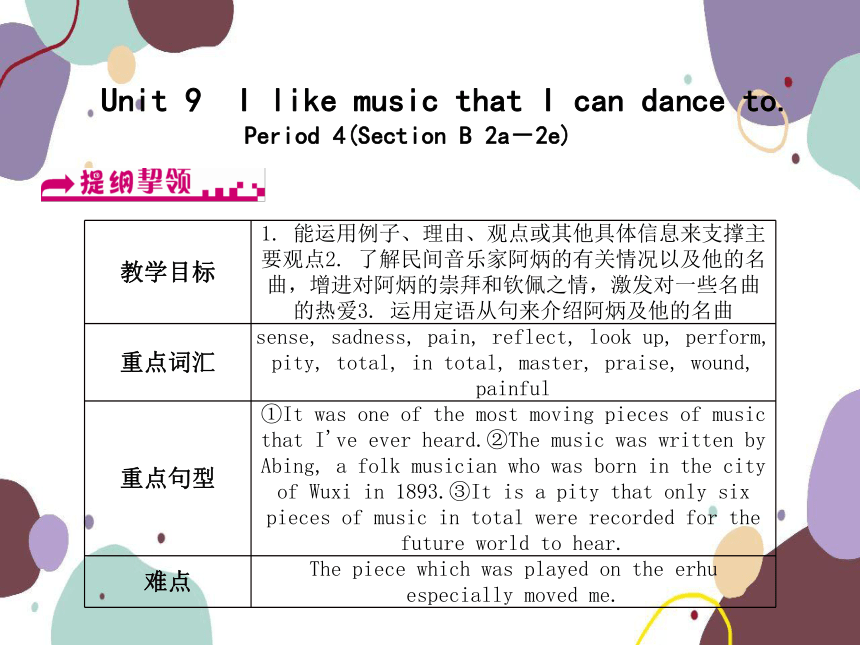 | |
| 格式 | pptx | ||
| 文件大小 | 226.9KB | ||
| 资源类型 | 教案 | ||
| 版本资源 | 人教新目标(Go for it)版 | ||
| 科目 | 英语 | ||
| 更新时间 | 2022-10-17 15:15:03 | ||
图片预览

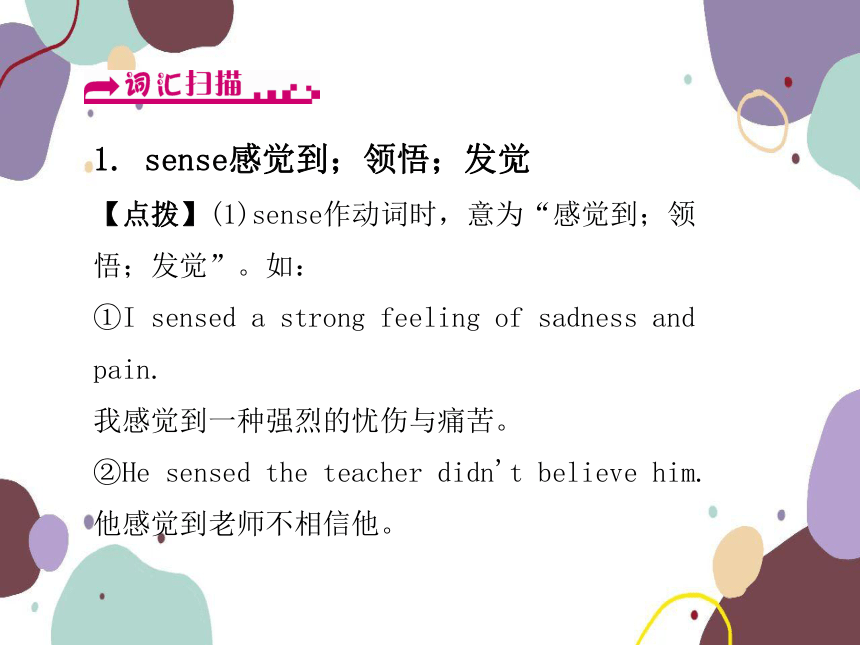
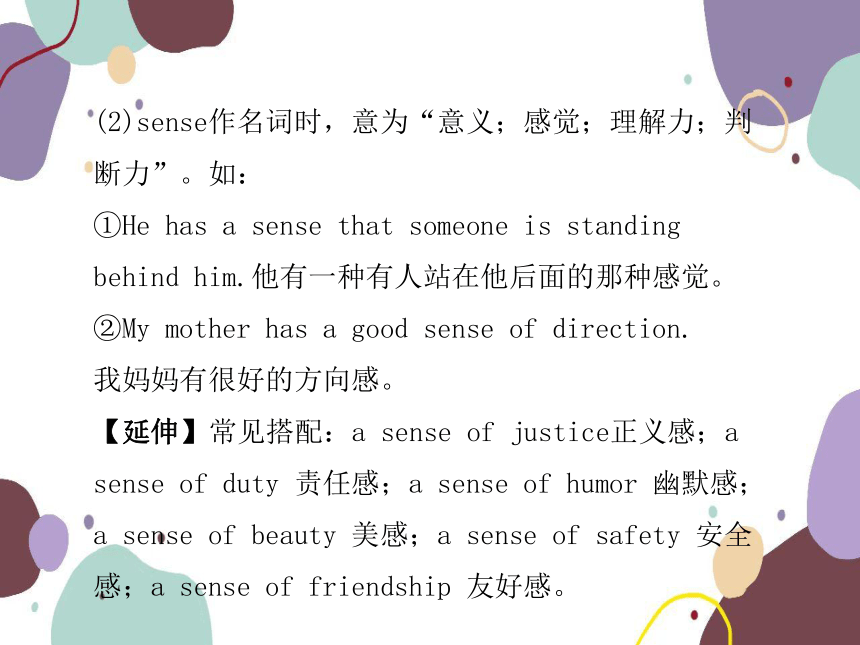
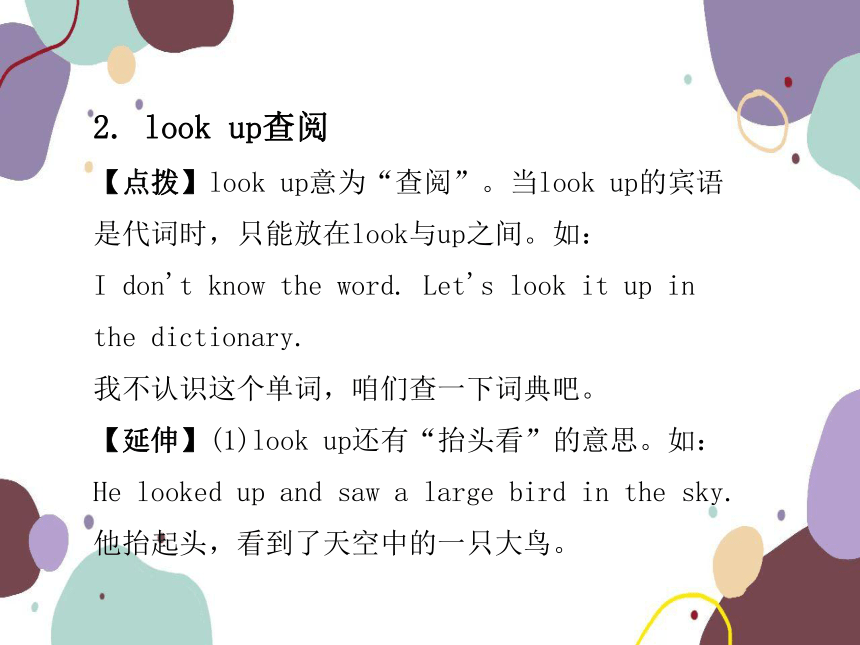
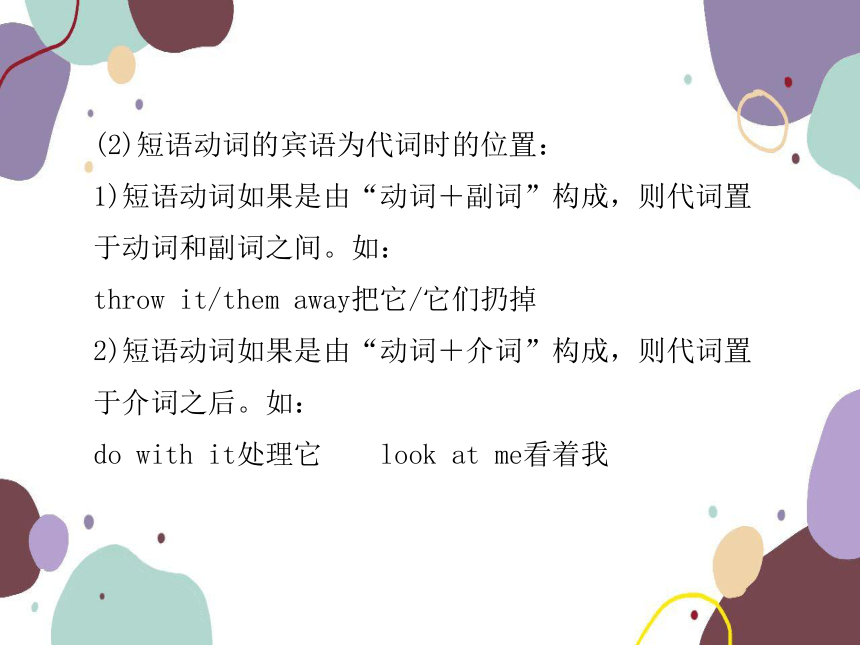
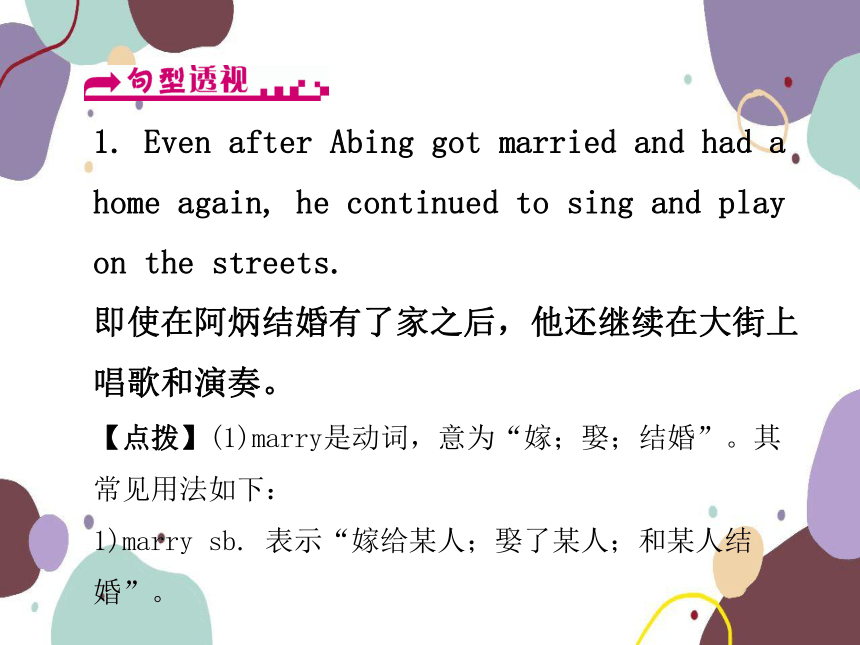
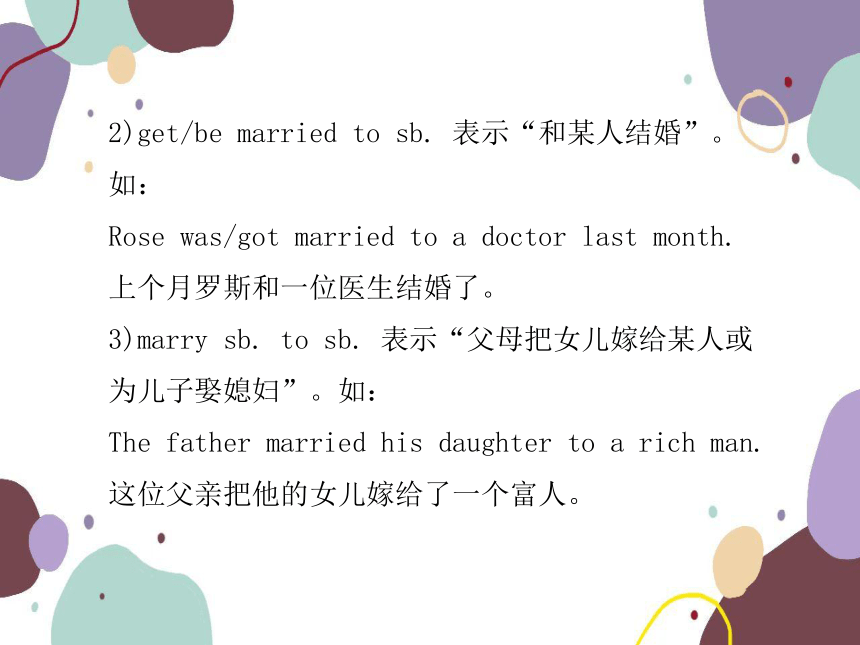
文档简介
(共15张PPT)
Unit 9 I like music that I can dance to.
Period 4(Section B 2a-2e)
教学目标 1. 能运用例子、理由、观点或其他具体信息来支撑主要观点2. 了解民间音乐家阿炳的有关情况以及他的名曲,增进对阿炳的崇拜和钦佩之情,激发对一些名曲的热爱3. 运用定语从句来介绍阿炳及他的名曲
重点词汇 sense, sadness, pain, reflect, look up, perform, pity, total, in total, master, praise, wound, painful
重点句型 ①It was one of the most moving pieces of music that I've ever heard.②The music was written by Abing, a folk musician who was born in the city of Wuxi in 1893.③It is a pity that only six pieces of music in total were recorded for the future world to hear.
难点 The piece which was played on the erhu especially moved me.
1. sense感觉到;领悟;发觉
【点拨】(1)sense作动词时,意为“感觉到;领悟;发觉”。如:
①I sensed a strong feeling of sadness and pain.
我感觉到一种强烈的忧伤与痛苦。
②He sensed the teacher didn't believe him.
他感觉到老师不相信他。
(2)sense作名词时,意为“意义;感觉;理解力;判断力”。如:
①He has a sense that someone is standing behind him.他有一种有人站在他后面的那种感觉。
②My mother has a good sense of direction.
我妈妈有很好的方向感。
【延伸】常见搭配:a sense of justice正义感;a sense of duty 责任感;a sense of humor 幽默感;a sense of beauty 美感;a sense of safety 安全感;a sense of friendship 友好感。
2. look up查阅
【点拨】look up意为“查阅”。当look up的宾语是代词时,只能放在look与up之间。如:
I don't know the word. Let's look it up in the dictionary.
我不认识这个单词,咱们查一下词典吧。
【延伸】(1)look up还有“抬头看”的意思。如:
He looked up and saw a large bird in the sky.
他抬起头,看到了天空中的一只大鸟。
(2)短语动词的宾语为代词时的位置:
1)短语动词如果是由“动词+副词”构成,则代词置于动词和副词之间。如:
throw it/them away把它/它们扔掉
2)短语动词如果是由“动词+介词”构成,则代词置于介词之后。如:
do with it处理它 look at me看着我
1. Even after Abing got married and had a home again, he continued to sing and play on the streets.
即使在阿炳结婚有了家之后,他还继续在大街上唱歌和演奏。
【点拨】(1)marry是动词,意为“嫁;娶;结婚”。其常见用法如下:
1)marry sb. 表示“嫁给某人;娶了某人;和某人结婚”。
2)get/be married to sb. 表示“和某人结婚”。如:
Rose was/got married to a doctor last month.
上个月罗斯和一位医生结婚了。
3)marry sb. to sb. 表示“父母把女儿嫁给某人或为儿子娶媳妇”。如:
The father married his daughter to a rich man.
这位父亲把他的女儿嫁给了一个富人。
(2)continue是动词,意为“继续”。
1)continue to do sth.=continue doing sth.,即表示“继续做某事”,其后既可接动名词也可接不定式,且意义相同。如:
They continued to meet/meeting daily.
他们继续每天都见面。
He continued to write/writing while in hospital.
他住院时继续写作。
2)表示继续维持某一情况时,其后可直接跟名词作宾语,也可先接介词with 再接宾语。如:
We will continue (with) the payments for another year.
我们这样的报酬还要维持1年。
2. It is a pity that only six pieces of music in total were recorded for the future world to hear, but his popularity continues to this day.
虽然可惜的是一共只有6首曲子被录下来供后人赏听,但他的名气却持续至今。
【点拨】pity既可作名词,也可作动词。如:
①What a pity you can't come with us!
你不能和我们一起来多可惜啊!
②He is much to be pitied.
他很可怜。
3. Today, Abing's Erquan Yingyue is a piece which all the great erhu masters play and praise.如今,阿炳的《二泉映月》是一首被所有的二胡大师演奏并高度评价的乐曲。
【点拨】(1)praise此处作动词,意为“赞扬;表扬”。常用短语:praise sb. for sth.,意为“因某事而赞扬某人”。如:
①We praised her courage.
我们称赞她的勇气。
②She praised her daughter for her hard work.
她因她女儿的辛勤工作而赞扬她。
(2)which all the great erhu masters play and praise是由which引导的定语从句,修饰a piece, which在定语从句中作宾语。
【延伸】定语从句的特殊情况:
(1)在下列几种情况下,通常只能用which:
1)引导非限制性定语从句(主句和从句用逗号分开)时。如:
The dog, which is black, is running toward its owner.那条黑色的狗正向它的主人跑去。
2)在定语从句中作介词的宾语,且介词位于关系代词之前时。如:
This is the middle school at which my mother teaches.
这就是我妈妈任教的中学。
(2)在下列几种情况下,通常只能用that,不能用which和who:
1)当先行词是all, anything, something, nothing, little, much, few等不定代词时。如:
Is there anything that I can do for you
需要我为您效劳吗?
2)当先行词被形容词最高级或the only, the very等修饰时。如:
This is the most beautiful music (that) I've ever listened to.
这是我听过的最美的音乐。
3)当先行词被序数词修饰时。如:
This is the first place (that) I visited last time.这是我上次参观的第一个地方。
4)当先行词既有人又有物时。如:
They often talk about the things and the people(that) they remember in the school.
他们经常谈论他们所记得的在那学校里的人和事。
5)当主句是以who, what或which开头的特殊疑问句时。如:Who is the girl that is giving a speech
那个在做演讲的女孩是谁?
Unit 9 I like music that I can dance to.
Period 4(Section B 2a-2e)
教学目标 1. 能运用例子、理由、观点或其他具体信息来支撑主要观点2. 了解民间音乐家阿炳的有关情况以及他的名曲,增进对阿炳的崇拜和钦佩之情,激发对一些名曲的热爱3. 运用定语从句来介绍阿炳及他的名曲
重点词汇 sense, sadness, pain, reflect, look up, perform, pity, total, in total, master, praise, wound, painful
重点句型 ①It was one of the most moving pieces of music that I've ever heard.②The music was written by Abing, a folk musician who was born in the city of Wuxi in 1893.③It is a pity that only six pieces of music in total were recorded for the future world to hear.
难点 The piece which was played on the erhu especially moved me.
1. sense感觉到;领悟;发觉
【点拨】(1)sense作动词时,意为“感觉到;领悟;发觉”。如:
①I sensed a strong feeling of sadness and pain.
我感觉到一种强烈的忧伤与痛苦。
②He sensed the teacher didn't believe him.
他感觉到老师不相信他。
(2)sense作名词时,意为“意义;感觉;理解力;判断力”。如:
①He has a sense that someone is standing behind him.他有一种有人站在他后面的那种感觉。
②My mother has a good sense of direction.
我妈妈有很好的方向感。
【延伸】常见搭配:a sense of justice正义感;a sense of duty 责任感;a sense of humor 幽默感;a sense of beauty 美感;a sense of safety 安全感;a sense of friendship 友好感。
2. look up查阅
【点拨】look up意为“查阅”。当look up的宾语是代词时,只能放在look与up之间。如:
I don't know the word. Let's look it up in the dictionary.
我不认识这个单词,咱们查一下词典吧。
【延伸】(1)look up还有“抬头看”的意思。如:
He looked up and saw a large bird in the sky.
他抬起头,看到了天空中的一只大鸟。
(2)短语动词的宾语为代词时的位置:
1)短语动词如果是由“动词+副词”构成,则代词置于动词和副词之间。如:
throw it/them away把它/它们扔掉
2)短语动词如果是由“动词+介词”构成,则代词置于介词之后。如:
do with it处理它 look at me看着我
1. Even after Abing got married and had a home again, he continued to sing and play on the streets.
即使在阿炳结婚有了家之后,他还继续在大街上唱歌和演奏。
【点拨】(1)marry是动词,意为“嫁;娶;结婚”。其常见用法如下:
1)marry sb. 表示“嫁给某人;娶了某人;和某人结婚”。
2)get/be married to sb. 表示“和某人结婚”。如:
Rose was/got married to a doctor last month.
上个月罗斯和一位医生结婚了。
3)marry sb. to sb. 表示“父母把女儿嫁给某人或为儿子娶媳妇”。如:
The father married his daughter to a rich man.
这位父亲把他的女儿嫁给了一个富人。
(2)continue是动词,意为“继续”。
1)continue to do sth.=continue doing sth.,即表示“继续做某事”,其后既可接动名词也可接不定式,且意义相同。如:
They continued to meet/meeting daily.
他们继续每天都见面。
He continued to write/writing while in hospital.
他住院时继续写作。
2)表示继续维持某一情况时,其后可直接跟名词作宾语,也可先接介词with 再接宾语。如:
We will continue (with) the payments for another year.
我们这样的报酬还要维持1年。
2. It is a pity that only six pieces of music in total were recorded for the future world to hear, but his popularity continues to this day.
虽然可惜的是一共只有6首曲子被录下来供后人赏听,但他的名气却持续至今。
【点拨】pity既可作名词,也可作动词。如:
①What a pity you can't come with us!
你不能和我们一起来多可惜啊!
②He is much to be pitied.
他很可怜。
3. Today, Abing's Erquan Yingyue is a piece which all the great erhu masters play and praise.如今,阿炳的《二泉映月》是一首被所有的二胡大师演奏并高度评价的乐曲。
【点拨】(1)praise此处作动词,意为“赞扬;表扬”。常用短语:praise sb. for sth.,意为“因某事而赞扬某人”。如:
①We praised her courage.
我们称赞她的勇气。
②She praised her daughter for her hard work.
她因她女儿的辛勤工作而赞扬她。
(2)which all the great erhu masters play and praise是由which引导的定语从句,修饰a piece, which在定语从句中作宾语。
【延伸】定语从句的特殊情况:
(1)在下列几种情况下,通常只能用which:
1)引导非限制性定语从句(主句和从句用逗号分开)时。如:
The dog, which is black, is running toward its owner.那条黑色的狗正向它的主人跑去。
2)在定语从句中作介词的宾语,且介词位于关系代词之前时。如:
This is the middle school at which my mother teaches.
这就是我妈妈任教的中学。
(2)在下列几种情况下,通常只能用that,不能用which和who:
1)当先行词是all, anything, something, nothing, little, much, few等不定代词时。如:
Is there anything that I can do for you
需要我为您效劳吗?
2)当先行词被形容词最高级或the only, the very等修饰时。如:
This is the most beautiful music (that) I've ever listened to.
这是我听过的最美的音乐。
3)当先行词被序数词修饰时。如:
This is the first place (that) I visited last time.这是我上次参观的第一个地方。
4)当先行词既有人又有物时。如:
They often talk about the things and the people(that) they remember in the school.
他们经常谈论他们所记得的在那学校里的人和事。
5)当主句是以who, what或which开头的特殊疑问句时。如:Who is the girl that is giving a speech
那个在做演讲的女孩是谁?
同课章节目录
- Unit 1 How can we become good learners.
- Section A
- Section B
- Unit 2 I think that mooncakes are delicious!
- Section A
- Section B
- Unit 3 Could you please tell me where the restroom
- Section A
- Section B
- Unit 4 I used to be afraid of the dark.
- Section A
- Section B
- Unit 5 What are the shirts made of?
- Section A
- Section B
- Review of Units 1-5
- Unit 6 When was it invented?
- Section A
- Section B
- Unit 7 Teenagers should be allowed to choose their
- Section A
- Section B
- Unit 8 It must belong to Carla.
- Section A
- Section B
- Unit 9 I like music that I can dance to.
- Section A
- Section B
- Unit 10 You're supposed to shake hands.
- Section A
- Section B
- Review of Units 6-10
- Unit 11 Sad movies make me cry.
- Section A
- Section B
- Unit 12 Life is full of the unexpected
- Section A
- Section B
- Unit 13 We're trying to save the earth!
- Section A
- Section B
- Unit 14 I remember meeting all of you in Grade 7.
- Section A
- Section B
- Review of Units 11-14
